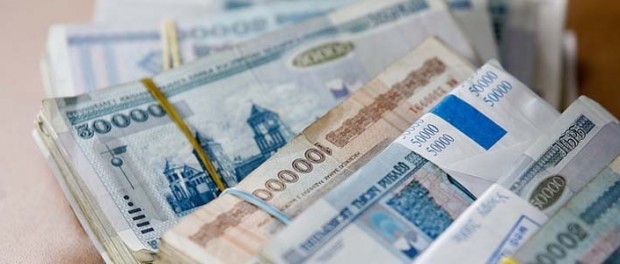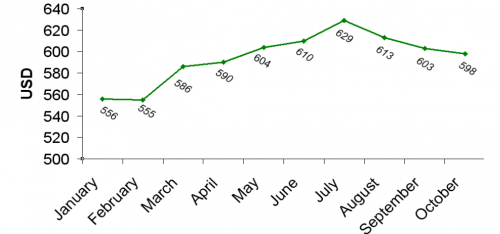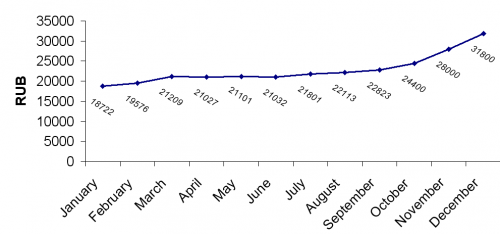More work and less money: wages forecast for 2015
Crisis in Russia will affect salaries of Belarusians -- no chances for payrise

In October, the average salary has dropped below 600 dollars. Although senior government officials assured that it would be 1000$ by the 2015. What will the real earnings of Belarusians be next year?
Depreciation of the Belarusian ruble against the dollar leads to the fact that the income in dollar equivalent is decreasing.Since the third quarter, when the government linked the growth of wages to productivity at enterprises, the rate of Belarusian ruble’s devaluation began to exceed the nominal growth in incomes.
So, in July average nominal wage was 629.3 dollars (at the average official exchange rate of the National Bank), in August – 613.6 dollars in September – 603.3 dollars in October – 598.5 dollars.

Average Belarusian wage in USD
On the other hand, Belarusian ruble strengthened against Russian ruble, since it has been falling down rapidly since July. As a result, Belarusians now earn more in Russian ruble terms.
At the beginning of the year the average wage did not even reach 19,000 Russian rubles, but it has exceeded 22,000 during the summer and 24,000 in October. Moreover, if we use the current exchange rate (December 3), it will turn out that Belarusians earn almost 32,000.
Unlikely, these calculations won’t make lot of people happy. Citizens of our country measure wages and prices in dollars.
Most of people keep their currency investments in dollars. Russian ruble, despite the close political relations between Moscow and Minsk did not become a mean for accumulation money. Less than 5% of deposits are denominated in Russian rubles.
Taking into account high “dollarization” of the economy, the population is monitoring exchange rates. Even the CEO’s of Belarusian banks in informal communication admit that they convert all the amounts to dollars. Therefore, people are most interested in how much will they earn in dollar terms.
There are different forecasts from the experts. Most of financial analytics suggest that earnings won’t fall next year because of political events.
“The average salary will be approximately $600. At least until the elections “- suggests an “Alpari” financial analyst, Vadim Iosub.
In turn, representatives of business associations expect that wages may even decrease in real terms.
“Wages will not have pace with both devaluation and inflation. We should talk about reducing expenditures and reaching such level of price when our products will be competitive at the foreign markets”, – said the chairperson of the “Club of Financial Directors” Andrey Karpunin.
All experts strongly believe that income growth in 2015 will not happen.
“Why should they raise? There is no revenue growth in the retail, while other companies have decline in profits”– says co-chairman of the Republican Confederation of Entrepreneurship Viktor Margelov.
Therefore, to rely on the growth of wages in real terms in 2015 is not worth it, experts say.
“You can forget about growth of salary in dollar terms, at some enterprises even nominal increase may not happen”, – predicts Andrew Karpunin.
Indicator of welfare
Statistical information confirms that the opportunities of Belarusian companies to raise salaries today are extremely limited.
In October, the real (inflation-adjusted) wages grew only in the Minsk region, due to its growth in Soligosk. “BelarusKali”(potassium producer) is located there, it did well this year – export has increased. Things are univocal in the other areas: real wages are decreasing.
Because wage growth in enterprises is linked with productivity growth, increase in the effectiveness of work may lead to an increase in wages of workers. However, given the difficult economic situation in Russia, which is the main market for Belarusian products, experts do not predict an early increase in labor productivity.
Under these conditions, the main factor that will affect the income of the population is Belarusian ruble. Currently, the national currency of Belarus is under severe pressure.
“The development of the country takes place in a very difficult external environment this year: the Russian ruble was devalued by 40% since the beginning of the year, Ukrainian hryvnia – 70%, Kazakhstan tenge – 20%”, – stated Prime Minister of Belarus Mikhail Myasnikovich.
Russian ruble’s fluctuations are still feverish – it continues to fall against dollar and euro.
“Geopolitical tensions in the world lead to the fact that the demand for foreign currency is growing” – Vadim Iosub explains the situation on the Russian financial market.
“However, despite the weakening of the Russian ruble, Belarusian authorities will try to keep the actual rate. In the short term, the Belarusian ruble will remain fixed. The problem is that policy focused on the control of ruble can’t be infinite. Sooner or later, we will have to free-float the ruble. It took half a year in 2011; I think it is not necessary to remind what happened with wages that time”, – say expert, referring to the period up to the elections.







Leave a comment